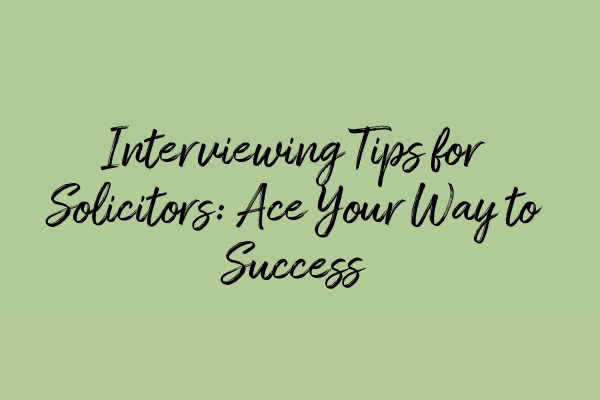Interviewing Tips for Solicitors: Ace Your Way to Success
Interviews can be nerve-wracking for anyone, but as a solicitor, it’s crucial to be well-prepared and confident to ace your way to success. The legal profession is highly competitive, and standing out during an interview is essential to secure your dream job. In this blog post, we will provide you with valuable interviewing tips that will help you leave a lasting impression on your potential employers.
Research the Firm
One of the biggest mistakes many candidates make is not thoroughly researching the firm they are interviewing with. Take the time to familiarize yourself with the firm’s background, practice areas, recent cases, and any notable achievements. This will not only impress your interviewers but also help you tailor your answers to align with the firm’s values and goals.
For example, if you are interviewing with a criminal law firm, make sure to read up on recent developments in criminal law and have a good understanding of related articles, such as:
- Private Prosecutions: Exploring Non-Governmental Prosecutions in Criminal Cases
- Understanding Drug-related Offences: Laws and Penalties in the UK
- Magistrates’ Court vs Crown Court: Different Paths in Criminal Proceedings
- Criminal Defence Strategies: Expert Approaches to Protecting Clients’ Interests
- Demystifying Criminal Law Procedures: A Step-by-Step Guide
Showcase Your Skills and Experience
During an interview, it is essential to highlight your skills and experiences that are relevant to the role you are applying for. This is your opportunity to showcase your expertise and demonstrate how you can contribute to the firm’s success. Prepare specific examples of cases or projects you have worked on that demonstrate your abilities in areas such as research, client communication, negotiation, or advocacy.
Additionally, mention any professional development activities you have undertaken, such as attending relevant seminars or obtaining certifications. This shows your dedication to continuous learning and staying updated on the latest legal trends and issues.
Prepare for Behavioral Questions
Behavioral questions are becoming increasingly common in interviews, and it’s crucial to be prepared for them. These questions aim to assess how you handle various situations and gauge your interpersonal skills. Practicing your responses to common behavioral questions will help you answer confidently and provide compelling examples.
For example, you may be asked to describe a challenging client situation and how you resolved it. Or, you may be asked to discuss a time when you had to work collaboratively with a team to achieve a successful outcome. By preparing specific examples and framing your responses using the STAR method (Situation, Task, Action, Result), you can effectively highlight your problem-solving skills and demonstrate your ability to work well in a team.
Ask Intelligent Questions
At the end of an interview, you will usually be given the opportunity to ask questions. This is not only your chance to gather more information about the firm and the role but also to demonstrate your interest and engagement. Prepare a list of intelligent, well-thought-out questions that show you have done your research and are genuinely curious about the firm’s operations and future plans.
For example, you could ask about the firm’s approach to pro bono work or their growth strategies for the next five years. This shows that you are interested in the firm’s values and long-term goals, and it also provides an opportunity for you to assess if the firm aligns with your own aspirations.
Dress Professionally and Maintain Professional Etiquette
First impressions matter, and dressing professionally is essential when attending an interview. Opt for a well-fitted suit and ensure your grooming is impeccable. A polished appearance shows that you take the interview seriously and respect the professional nature of the role.
During the interview, maintain professional etiquette by giving your full attention to the interviewer, listening attentively, and providing thoughtful responses. Remember to maintain positive body language, such as maintaining eye contact and sitting upright.
Follow Up with a Thank You Note
After the interview, it’s crucial to follow up with a thank you note or email to express your appreciation for the opportunity to interview. This allows you to reiterate your interest in the role and leaves a positive, lasting impression on the interviewers.
In conclusion, acing an interview as a solicitor requires thorough preparation, showcasing your skills and experiences, and maintaining professionalism. By researching the firm, preparing for behavioral questions, asking intelligent questions, dressing professionally, and following up with a thank you note, you can increase your chances of success. Good luck!


Leave a Reply